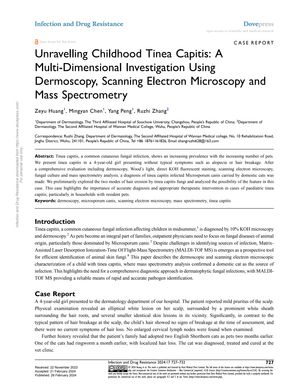Unraveling Childhood Tinea Capitis: A Multi-Dimensional Investigation Using Dermoscopy, Scanning Electron Microscopy, and Mass Spectrometry
February 2024
in “
Infection and drug resistance
”

TLDR Tinea capitis in a child was caused by a fungus from cats, highlighting the need for accurate diagnosis and treatment.
This study presents a case of tinea capitis in a 4-year-old girl who did not exhibit typical symptoms like alopecia or hair breakage. Through a comprehensive evaluation using dermoscopy, Wood's light, direct KOH fluorescent staining, scanning electron microscopy, fungal culture, and mass spectrometry, the infection was identified as being caused by Microsporum canis, likely transmitted by domestic cats. The investigation also explored two modes of hair erosion by tinea capitis fungi. The case underscores the importance of accurate diagnosis and appropriate treatment, especially in households with pets.
